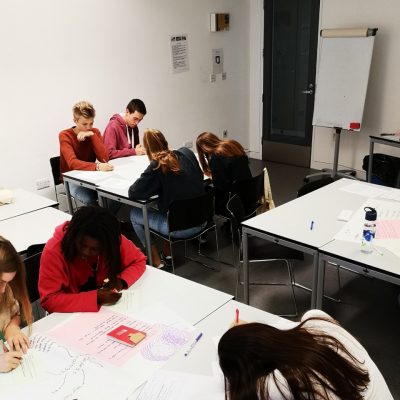Article
Noor Evers (2019 Sarajevo Fellowship) is passionate about the nexus between climate change and the environment, politics and human rights. She thinks that there is a negative stigma surrounding the word ‘politics’ as corrupt and power-hungry, but that politics also play a huge role in the response to the climate crisis. It is crucial to think of new, engaged forms of governance that can assist in a democratic, participatory and sustainable transition of the economy and society. Furthermore, a healthy environment is a fundamental human right. Both of these aspects are crucial to incorporate into educational sessions for younger people, who will grow up as a generation faced with the stark consequences of the climate emergency.
“I found it interesting to hear the personal connections to climate change that these students made – such as how recycling can be improved in their work location or how they have campaigned against plastic at school. This gave me insight into how to organise meaningful dialogues and training to encourage young people to act for environmental protection.” – Noor Evers (2019 Sarajevo Fellowship).
For her Action Project, Noor co-organized two university-based outreach initiatives to extend educational opportunities in the city of Bristol in the United Kingdom. With her project, she addressed the fact that there are disparities in different groups’ access to educational opportunities in Bristol.
Noor had noticed that young secondary school students are not widely included in discussions of climate change and the political and technological mechanisms to tackle related global issues, so she organized a conference for secondary school students that included workshops, guest speakers and a panel. The full-day event, ‘The Climate Emergency, Education and Democratic Leadership’, united young people with climate scientists, activists, employers, and government representatives to foster a dialogue on solutions to the climate emergency.
As a second initiative, Noor organized a University Open Day for people with refugee or asylum-seeking backgrounds. The Open Day provided participants with practical information on scholarships, an introduction to course options, and a look into the student experience. Potential applicants were shown around the university campus, given information on scholarship application processes, and given two guest lectures. Beyond practical matters, her intention was to make potential students feel that the university was an open and welcoming space for them to study.
For both initiatives, Noor collaborated with existing local organizations, which ensured that her project could be more effective and impactful. She expects to have directly reached around 75 young people or people with a refugee background with both initiatives.

